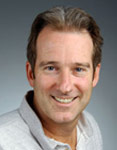PLOS Genetics editors – David Kwiatkowski and Peter McKinnon
The first post in our PLOS Genetics’ editors series introduces David Kwiatkowski, Brigham and Women’s Hospital and Harvard Medical School, USA and Peter McKinnon, St Jude Children’s Research Hospital, USA, who are Section Editors for Cancer Genetics. David and Peter began their roles on PLOS Genetics in October 2014 and February 2014, respectively. Here they provide an introduction to their background and research, tell us about their positions on the PLOS Genetics Editorial Board, and explain how they feel their role fits into the mission of PLOS Genetics and PLOS as a whole.
David Kwiatkowski:

I am an oncologist and geneticist, with some research specialisms; however, I maintain a broad range of interests across the field of cancer genetics. Growing up, I loved and was very good at mathematics which led me to undertake a BSc and PhD in Mathematics at Caltech and the Massachusetts Institute of Technology, respectively. Subsequently, I decided that I wanted to pursue something more practical and went to medical school. During medical training, I became interested in Medical Oncology, which appealed to me due to the possibility of treating and curing an otherwise fatal disease, and the intensity of the patient-doctor relationship.
Fellowship training introduced me to biomedical research, and I felt a natural affinity for genetics, which was an expanding field at the time. Mostly by chance my research led me to study Tuberous Sclerosis Complex (TSC) from a genetic perspective, and this disorder, which results in non-cancerous tumours, became my lifelong research interest. It has been gratifying in TSC research to see the progression from gene identification, to pathway definition, to therapeutic success, although there is still a long way to go. I have continued to practice as a thoracic oncologist at the Dana Farber Cancer Institute, USA.
About five years ago, I undertook a mini-sabbatical at the Broad Institute with Gad Getz and Matthew Meyerson. The era of modern cancer genetics was just beginning and the sabbatical gave me the opportunity to learn computational and statistical methods, in addition to participating in several projects run by The Cancer Genome Atlas (TCGA).
I am one of two Senior Editors in the Cancer Genetics section of PLOS Genetics, along with Peter McKinnon. My favorite part of this role is the weekly calls, in which we review new submissions, typically about five new manuscripts. This review pushes me to stay current on all aspects of cancer genetics, and the interaction and discussion with Peter is always fun. It is also gratifying to attempt to accelerate the review process as much as I can, and it is always satisfying when a review has been completed and the letter sent to the author, especially when it is an acceptance!
The mission of PLOS is to advance Open Access scientific research, and I am pleased to play a role in advancing this objective. It is also worth noting that PLOS maintains very high standards of manuscript review and conflicts of interest, which means that Peter or I recuse ourselves from any role in the review of manuscripts in which we have any possible competing interests.
Peter McKinnon:

I grew up in a small town in Australia and wanted to become a research scientist focusing on chemistry. An early and important start for me was an after school job in an old-style English pharmacy (in Australia they are referred to as a Chemist shop; so what better start than to get a job doing ‘chemistry’). This Chemist shop was from the turn of the 20th century, and still had shelf upon shelf filled with large exotic glass bottles with chemical names gold-etched in Latin, making it feel that I was immersed in chemistry. The reality was that the job mostly entailed counting pills into bottles for prescriptions, and very occasionally watching the pharmacist formulating some old-style skin creams. Upon entering University, I maintained my interest and specialised in biological chemistry, and eventually molecular biology. For the last two decades, my scientific work has focussed on understanding the processes of DNA damage signalling, and its relationship to human disease, with an emphasis on the nervous system. These topics overlap broadly with DNA repair, neuroscience and cancer.
As an editor for PLOS Genetics, I see my role as helping to maintain the high quality content the journal publishes. This mainly involves acting as a co-Senior Editor with David Kwiatkowski for the Cancer Genetics section and we aim to identify exciting and topical papers that provide a range of new findings of broad relevance to genetics research and cancer. One of the great things about being an editor is the opportunity to see such a large amount of high-calibre science. David and I work by consensus when we are evaluating papers, and I believe that having the two of us discuss each manuscript is important to ensure balance and fairness as we decide which manuscripts should be sent out for review. We aim to continue to ensure that PLOS Genetics is a high-quality journal that researchers consider when deciding where to submit an exciting new story for publication.

[…] Source: Google Genetic News […]
[…] The first post in our PLOS Genetics’ editors series introduces David Kwiatkowski, Brigham and Women’s Hospital and Harvard Medical School, USA and Peter McKinnon, St Jude Children’s Research Hospital, USA, who are Section Editors for Cancer Genetics. David and Peter … Continue reading » […]
[…] Board, PLOS Genetics and Open Access. For the first installment in this series, check out the blog post by Cancer Genetics Section Editors, David Kwiatkowski and Peter […]
[…] Board, PLOS Genetics and Open Access. For the first installment in this series, check out the blog post by Cancer Genetics Section Editors, David Kwiatkowski and Peter […]
[…] Board, PLOS Genetics and Open Access. For the first installment in this series, check out the blog post by Cancer Genetics Section Editors, David Kwiatkowski and Peter […]
[…] Board, PLOS Genetics and Open Access. For the first installment in this series, check out the blog post by Cancer Genetics Section Editors, David Kwiatkowski and Peter […]
[…] post is the third in our series featuring the journal’s editors, and follows on from an initial post by Cancer Genetics Section Editors, David Kwiatkowski and Peter McKinnon, and a second post by […]
[…] post is the third in our series featuring the journal’s editors, and follows on from an initial post by Cancer Genetics Section Editors, David Kwiatkowski and Peter McKinnon, and a second post by […]